A Celiac diagnosis is far more serious than the gluten-free fad diet. When you're first told to go gluten free, it seems like only a dietary restriction. But the more you know about autoimmune diseases, the better you understand the impact this condition has on your life.

[social_warfare buttons]
In this post we evaluate the seriousness of celiac disease as a chronic illness and why I decided to change my career upon diagnosis.
3 Ways a Celiac Diagnosis Impacts your Life
1. It affects your relationships
Maybe you used to eat brunch every Sunday with your friends, trying a new restaurant each week. Now, your restaurant choices are limited to celiac-safe places only.
For me, I went to dim sum every month with a group of friends. After going gluten-free, I learned that there were no gluten-free knowledgeable dim sum restaurants in Seattle. I felt left out of this important bonding ritual. My friends were understanding as to why I couldn't join, but it didn't change the feeling of missing out on this valuable time with them.
This is only one example of how a strict gluten-free diet affects your relationships. Many of us struggle with family members and friends who don't understand our needs and pressure us to try unsafe foods. This can result in damaged relationships or the need for us to distance ourselves to protect our health and wellbeing.
Related: 5 Things Everyone Should Know about Celiac Disease
2. It changes your routine
Most celiacs find the need to make more time in our schedules to meal prep and cook each week. Take-out is often limited or not an option requiring us to be more prepared.
Researching restaurants, gluten-free travel research and more can take a lot of time and limit our ability to act spontaneously. Thankfully, we have a great community of online gluten-free advocates who can help us with this research.
You can find easy food and travel help on this site in our blog posts and in our Free Resource Library:
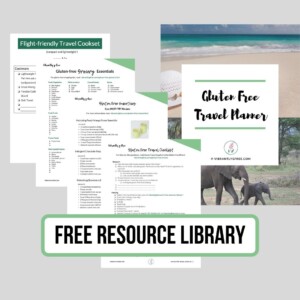
Get unlimited access to our Free Resource Library with Grocery Lists, a Travel Planner, Packing Checklists, and more!
Did you know... In Italy, people diagnosed with celiac disease are given one day off each month with the understanding that a strict gluten-free diet requires more time and planning.
You may need to visit special grocery stores, make meals ahead of time and freeze them, or make things you used to buy at the store from scratch to keep yourself safe and healthy.
3. It causes challenges at work.
Work dinners, staying late at the office, and work-related travel can all cause problems for someone needing to find strict gluten-free food. Not to mention the attention we draw to ourselves when we ask a million questions to advocate for our needs at a restaurant or food event.
Also, the strictness of our diet often invites skepticism - this is one of the reasons Celiac Disease advocacy is so important.
Why I changed Careers after a Celiac Diagnosis
When I was diagnosed with celiac disease, I was working as a research oceanographer. This meant spending much of my time on ships and at field sites where food was provided for us. When I was still healing a few months after my diagnosis, I stayed at a field site for several months. All food was included to support a busy and intense research schedule.
Despite advocating for myself, I got very sick on multiple occasions. When I wasn't at the field site, I was often on ships with small galley kitchens that could not keep wheat ingredients separate from gluten-free foods.
Celiac Disease was less known and diagnosed then. When I discussed my gluten-free needs with the chefs of these galley kitchens, they were unable to make changes that would provide celiac-safe meals.
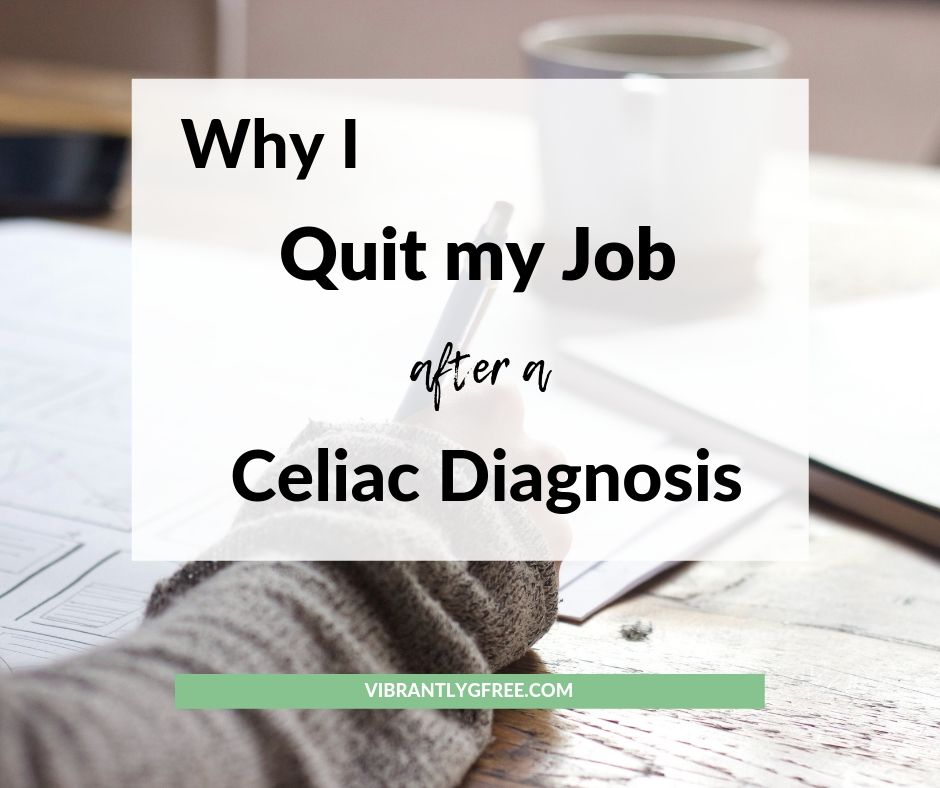
Since I felt ill and experienced joint pain, brain fog, and exhaustion, my work quality suffered as well. The struggle with an invisible illness such as celiac disease is that I can feel terrible but look fine (other than the big bags under my eyes - does this happen to anyone else?). This led to increasing frustration that I was unable to function at my best while in intense live-in situations with other researchers.
While there were other factors playing into my decision to change careers, my celiac diagnosis weighed in heavily. I quit my job and switched to teaching. As a teacher, I have a predictable work schedule and am able to make my own food at home each night.
The Silver Linings of my Celiac Diagnosis
First of all, I love teaching! My career change led me to something I enjoy more than research. But on a broader scale, the silver lining is that celiac disease has required me to evaluate my life more intentionally.
Here are 4 key silver linings that I am grateful for each day:
- I choose who I spend my time with and what I spend my time on more intentionally, since eating strictly gluten-free is time demanding.
- My diet and nutrition improved since I am more careful about my food choices. I always know what’s in my food and can make informed decisions.
- I overall have so much more energy! This comes from discovering that I must eat gluten-free as well as paying more attention to my health and wellness overall.
- I found a sense of purpose by sharing my journey to help and inspire others with similar struggles.
I wish more people understood the seriousness of having an invisible chronic illness. From broad lifestyle implications that are ongoing to drastic changes such as quitting a job, there’s a lot more to it than simply omitting an ingredient from our diet. However, much of my personal development and growth stemmed from managing these challenges in my 20s. The overall silver linings have proved so valuable that I wouldn’t change my experience if I had the chance. Do you feel like this too?
Related posts:
With love and gratitude,
❤︎ Jamie
Help advocate for Celiac Disease - Pin the image below by clicking the 'save' button in the top left corner:

Get unlimited access to our Free Resource Library with Grocery Lists, a Travel Planner, Packing Checklists, and more!


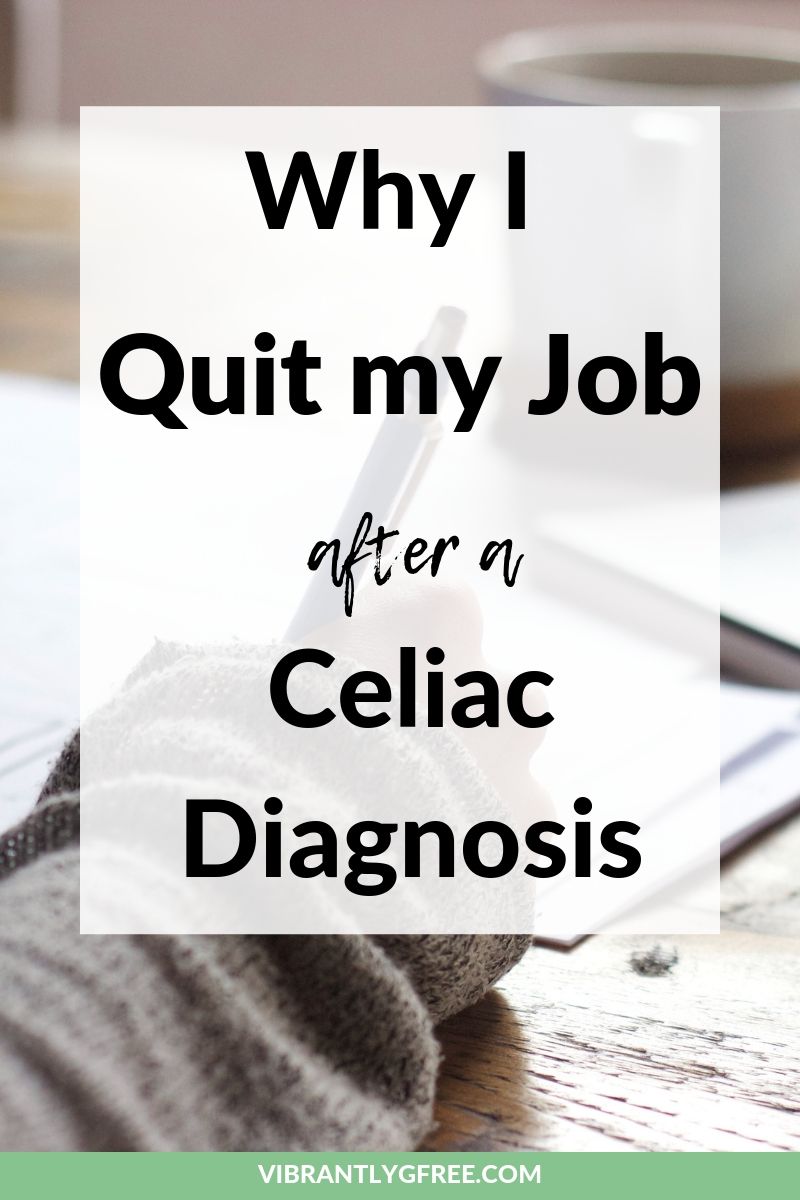
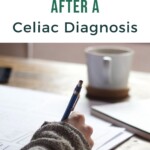
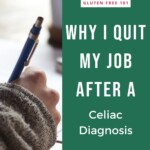
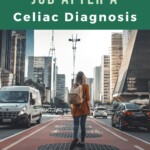
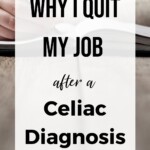
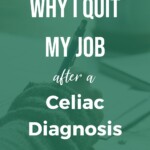
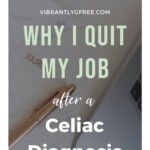
Erin
I came across your article while doing a search for "good jobs for people with Celiac Disease" (just to see if there were any related articles on the subject). Coming upon your article made me feel understood and at ease, right away. I finally feel like there's someone with CD who relates to what I've experienced - minus the oceanography career ;). Thank you for this write-up; it's one that will be shared with many because it advocates, without being preachy, and it's understandable. Thanks for this.
Jamie
Thank you so much for your kind words Erin! I hope you find a job that works well for you <3
Jacque
I was diagnosed with Celiac at age 40. It is just one of 3 autoimmune diseases I have. I am an RN and will not take a travel job since I am not sure of where I am going or how to handle food purchases. I have learned that so many more countries are way better at this than the US. I had NO trouble in New Zealand getting gluten free restaurant foods. I also found some travel information about other countries that are terrific for celiacs. Good luck to you.
Jane Meiram
Thank you for sharing your story. I could relate 100%. I had Hashimoto’s hypothyroidism and remained undiagnosed for years until I could no longer function. I felt the symptoms like chronic fatigue, unexplained anxiety, brain fog, significant weight gain. I noticed that as time passes I am becoming a different person - irritated, overly sensitive. Things got worse when memory loss kicked in. I was in early 30s and involved in medical/healthcare research. You can imagine a researcher with a memory loss. Had to give up my employment to gain my health back. I am not celiac but have to follow gluten-free diet for my autoimmune condition. It makes me feel well and sustainable long-term.
Celiac Sojourness
Wow Jane thank you so much for sharing your story and that sounds so tough! I was an oceanography researcher and had memory loss too -- it was mortifying. I am so glad the gluten free diet is serving you well <3
Ess
Thank you for this!
I had to quit my job in health science research. Not only was it prohibitive in that I had no time to look after myself properly, but the stress (from other issues) seemed to worsen my symptoms too! In the strangest way, I'm also relieved to know I'm not the only one with that horrendous brain fog and memory loss. It is awful. It certainly changes my experience of the world. To see that I am not alone in this experience, does help me feel a lot more optimistic and less judgemental of myself. Thank you for such a thoughtful article.
Jamie
I'm so glad we can find solidarity in this! The brain fog and memory loss are still my most challenging symptoms. I hope you found another job that you enjoy <3
Susan
❤️ the oceanography community misses you!
Celiac Sojourness
Thanks, Susan! But at least you won't be missing me for too long - I'm headed your way very soon 🙂 Also - thank you for being the friend that supported me when I was doing the field work and feeling terrible <3 You're the best and I miss you!